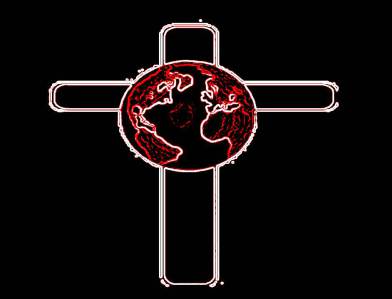Why is this night different than any other
night?
This
question, asked by children at the Passover Seder all over the world, sets the
tone for the evening’s reflection and feast.
The leader then recites the story of salvation from slavery in
Egypt. We hear again of the plagues God
puts on Egypt, the slaughter of the Passover lamb and the parting of the Red
Sea. We remember the bitter tears of the people as they made bricks without
straw and we are given the sweet charoset to remember that life is not only
bitter. But the overriding message is
one of salvation and deliverance.
But today
and tonight, we ask the same question, “why is this night different than any
other night?” The answer is similar, but not the same. For the Christian, the
reason for the night’s different lies not in the Passover, but in the Cross.
Today we
arrive at the end of the road to the cross.
We have arrived at the foot of the cross to behold the innocent victim
slain.
The cross.
What can we
say about the cross that has not already been said? Perhaps there is no need to say anything new,
but to remind ourselves about the meaning of the cross. For Luther, the Christian must come to a
complete stop at the cross to think about the crucified God. Either we will accept the cross and cling to
it, or we will reject it and scorn it. As Paul said, the cross is “a stumbling block
to the Jews and folly to the Gentiles” (1 Corinthians 1:23).
If we reject
the cross, we must reject Jesus and leave him behind. Jesus’ crucifixion was not an accident and it
was a failure. Jesus came into this
world and set his face towards’ Jerusalem.
He knew even before He started that his road would lead to the
cross. He accepted this as His purpose
and even when he acknowledged the agony of the cross, he still submitted to
it.
But why?
What was the point? What did he do on the
cross and why did he have to die on the cross?
Paul hints at the answer to this
question in Colossians 1: For in him
all the fullness of God was
pleased to dwell, 20 and through
him to reconcile to himself all things, whether on earth or in heaven, making
peace by the blood of his cross.
21 And you, who
once were alienated and hostile in mind, doing
evil deeds, 22 he has now reconciled in
his body of flesh by his death, in
order to present you holy and blameless and above
reproach before him,
In the cross
of Christ, lays the reconciliation of the world with God. The world was once alienated from God through
the power of sin and death, but now we have been brought close to God through
Christ’s sufferings. Our acceptance and
reconciliation lies in Christ’s death.
Our
journey to the Cross is our journey to God, because only through the cross can
we come near to God. Our sins must be
punished and our debt must be paid. This
Jesus does when He goes to the cross.
This simple
act changes our world and creates a new reality for us. Just like the Jews who were able to escape
Egypt into a new world, so now we have been able to escape from a dark world
and enter into God’s family, his household.
Many religions
offer a way to God, if only you will do x,y,and z. Christianity is the only religion that says
you cannot get to God, that God has to come to you. Most religions say that you must sacrifice in
order to get to God, in Christianity, Jesus is the sacrifice Himself who paves
the way for us to stand before God.
This
dramatically (or should dramatically change) the world. The cross and suffering, not military power and
wealth, is the way to victory and the way to salvation. In 323, when Constantine heard the message, “by
this sign will you conquer” he almost had it right. Unfortunately, he saw this as a political answer
to create a political empire.
Christianity has never been about a political empire and the cross is
the positive sign of this.
Instead
of seeking an authority based, power hungry organization to rule the world with
an iron fist, the cross tells us that if we want victory, we must sacrifice
ourselves, our very lives on behalf of others who not only do not believe the
way we do, but mock and scorn us. The
cross tells us that the reconciliation of man with God is not to be sought in
power, but in weakness.
Only when
we see Jesus nailed to the cross, do we understand not only how deep God’s love
is for us, but how deep our love for our neighbor should be. We see Jesus willing to submit to cruel and
vicious people for the good of those who shouted to crucify him. So too, should the church be willing to
sacrifice herself and submit to those who would crucify her. In this, we see the perfect picture of love and
a model for us to minister to a world that needs to be reconciled to God.
When we understand the cross in
its entirety, we understand what Jurgen Moltmann meant when he said that
"God became man so that dehumanized men might become true men."
The cross is the basis for a new society....one in which fair treatment
does not need to be dictated by law but springs up from God's love for us and
the new creation. People are not divided by race, but differences are
celebrated as diversity within God's family. Hatred is replaced by love
and war is overcome by peace. Indeed the entire fractured world is held
together by God's love expressed on the cross.






No comments:
Post a Comment